“Time travel used to be thought of as just science fiction, but Einstein's general theory of relativity allows for the possibility that we could warp space-time so much that you could go off in a rocket and return before you set out.” -Stephen Hawking
As always, there's been a new fantastic week of articles here at Starts With A Bang, punctuated by our new podcast this month, on the physics of time travel!
Have a listen (or download it and take it with you) and thank our Patreon supporters for making it possible! Now, what was this past week all about? Come enjoy some fabulous stories if you missed anything, including:
- What should a black hole's event horizon look like? (for Ask Ethan),
- What's the largest planet in the Universe? (for Mostly Mute Monday),
- Science discovers how complex life came to the Galapagos Islands,
- We've lost sight of the most important rule in debating science,
- How to prove Einstein's relativity for less than $100, and
- Is time travel possible, according to science?
There's always so much more I could have talked about or so many more details I could have gone into but didn't, and that's what makes doing a follow-up so informative and educational. So let's jump into what you wanted to learn or discuss more about here, and enjoy our comments of the week!
From Michael Mooney on his 'key issues' with relativity: "I am sorry that you refuse to address the core of the issue I bring to your forum.
Is there a “real world” independent of observation or not? (Yes, there is.)
Does the Earth physically change dimensions when (if ever) viewed from near light speed or not? (Ans: Not)
Does Earth’s atmosphere physically change in depth/height “for” every incoming muon or not? (Ans: Not.)"
When I "refuse to address" your issue it's because you are asking a question that doesn't have a scientific answer. I'm not in the business of giving you uninformed opinions and asserting them as facts. So if you want these three questions answered with scientific accuracy, let's go.
1.) We cannot and have not ever measured the world independent of observation, and will never be able to do so. That is a fundamental limit of being a physical being in a physical Universe. Some things we can not observe for a very long time, then look at them and they will be exactly the same as a deterministic equation predicted. Others, if we observe them continuously, will give different results than if we didn't look. So is there a "real world" independent of observation? You can't answer, and I also assert that your quoted phrase "real world" is ambiguously defined.
 Moving close to the speed of light results in times and distances transforming, with lengths -- including the length of your starship -- becoming shorter in the direction of motion. Image credit: David Taylor of Northwestern, via http://faculty.wcas.northwestern.edu/~infocom/Ideas/einstein.html.
Moving close to the speed of light results in times and distances transforming, with lengths -- including the length of your starship -- becoming shorter in the direction of motion. Image credit: David Taylor of Northwestern, via http://faculty.wcas.northwestern.edu/~infocom/Ideas/einstein.html.
2.) Does Earth physically change dimensions when viewed near the speed of light? The answer is yes, dependent on which observer you ask. If I ask you, on Earth, whether Earth's physical dimensions change, the answer is no. If I ask the traveler whether they do, the answer is yes. There are some things that are invariant under relativistic transformations, but physical extents in space are not one of them.
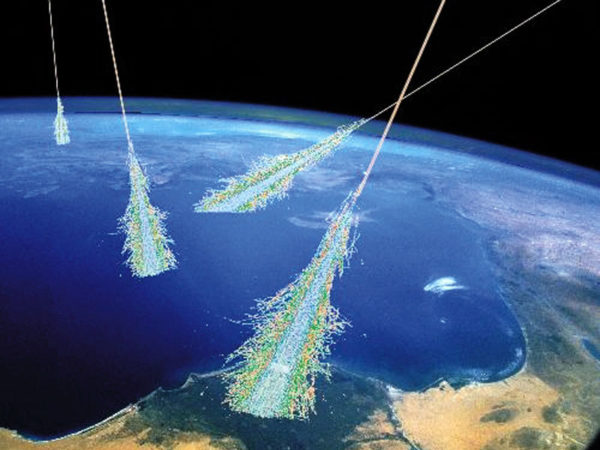 Cosmic rays shower particles by striking protons and atoms in the atmosphere, but they also emit light due to Cherenkov radiation. Image credit: Simon Swordy (U. Chicago), NASA.
Cosmic rays shower particles by striking protons and atoms in the atmosphere, but they also emit light due to Cherenkov radiation. Image credit: Simon Swordy (U. Chicago), NASA.
3.) Does the Earth's atmosphere change for every incoming relativistic particle? It's not a "change," as you incorrectly use the word, but it achieves a unique size/extent with respect to that particle, defined by that particle's motion. The size of the atmosphere is entirely dependent on that particle's frame-of-reference, and there is no definition of size/length/distance/spatial extent independent of reference frame in relativity.
Now, I have stated previously to you that there is an apparent length contraction that is not visually real, and I want you to understand why. If an object is moving close to the speed of light and it is emitting/reflecting photons, the way the object appears will often be uncontracted because of the superimposed effects of length contraction atop the fact that the speed of light is finite and not much greater than the moving object. You can also get visual effects that appear to move faster-than-light, known as photonic booms. But the thing you want to be invariant -- the physical size of a physical object -- simply isn't, nor is it well-defined in the absence of an observer.
From Elle H.C. on the future of science: "‘Real’ physical testing isn’t going to open any new doors (physics). The future will come from fiddling and experimenting with computer simulations."
The day we stop doing experimental or observational tests of our theories -- the day we totally divorce science from testability -- is the day we stop doing physics. Do you know where the word physics comes from? It's from the ancient greek work, φύσις, which is best translated as "nature." The study of physics is a study of the natural, physical world. Simulations are useful, particularly about the past, but are only really informative when you can compare the results of a simulation with something physically observable.
If you don't deem it necessary to compare the existing Universe with what you predict or simulate, you are engaging in exercise for your imagination and for possibilities, but you are not doing physics. If you think there are no more doors to be opened, that's fine; I don't care if you give up. Just don't expect many followers, particularly among physicists.
Artist's impression of a black hole. What goes on outside the black hole is well understood, but inside, we run up against the limits of fundamental physics... and potentially, the laws governing the Universe itself. Image credit: XMM-Newton, ESA, NASA.
From Andrew on event horizons in classical vs. quantum realities: "Remarkable, that event horizon, as it is described by GRT is far from what quantum theory says. When an observer falls to the black hole and crosses aforementioned event horizon, he notice nothing extraordinary (well, if the black hole is large enough). But, in accordance with quantum theory, there will be a firewall..."
So just to refresh your memory, because it's been about four years since I wrote about it, here's the deal with black holes, event horizons and firewalls:
- Classically, the event horizon is the region within nothing, not even light, can escape.
- Outside the event horizon, there is a location where you can have an innermost stable circular orbit (ISCO), where things outside of that orbit can exist stably but anything inside of it will spiral into the black hole.
- In quantum physics, particles are entangled, meaning that two particles can have a property where the sum of the states is known, but an individual state of each is not determined until one or the other is measured.
- If one entangled member of a pair falls into a black hole, and you measure the other one, you break the entanglement... but that causes a "firewall" of energetic particles to descend onto the black hole.
Given that particles fall into black holes and quantum entanglement is real, are firewalls real, and do you get fried falling in as a result? Probably not.
A 2013 paper showed that entanglement across all event horizons is maximized, which pushed the time of black hole firewall formation out to... infinity. Since black holes decay in a finite time, these firewalls shouldn't exist in our Universe. It's not that quantum physics is in conflict with classical physics, though; it's that this is an effect that shows up only when you add quantum effects in to your background of classical spacetime.
We still have not figured out a quantum theory of spacetime, or of gravity, which some argue will be necessary to fully understand the firewall paradox, and other paradoxes about black holes.
The eight planets of our Solar System and our Sun, to scale in size but not in terms of orbital distances. Mercury is the most difficult naked-eye planet to see. Image credit: Wikimedia Commons user WP.
From eric on an amusing fact about the 8 planets in our Solar System: "Amusing factoid: every planet in our solar system is more massive than all the planets smaller than it, combined. Thus, Venus has more mass than Mercury+Mars, Earth has more mass than Mercury+Mars+Venus, Uranus has more mass than Mercury+Mars+Venus+Earth, and so on."
What's also interesting is not just that this is true, but that it's barely true! Venus (82% of Earth) plus Mars (11% of Earth) plus Mercury (5.5% of Earth) is almost equal to the mass of Earth, but not quite. Uranus (at 14.54 times the mass of Earth) plus all the rocky planets (1.98 Earth masses) comes out to 16.52 Earth masses, just shy of Neptune's 17.15 Earth masses.
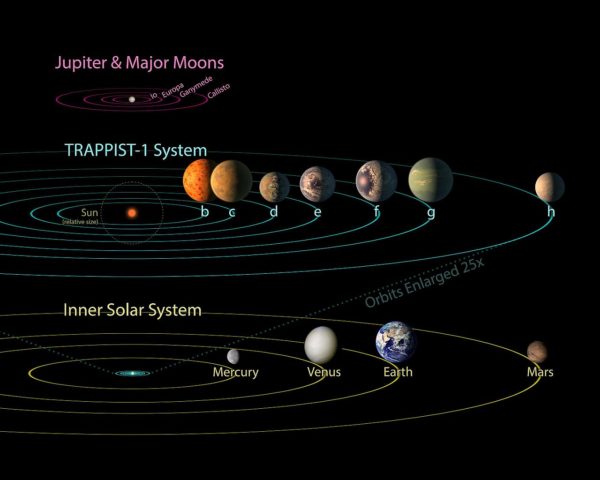 TRAPPIST-1 system compared to the solar system; all seven planets of TRAPPIST-1 could fit inside the orbit of Mercury. Note that at least the inner six worlds of TRAPPIST-1 are all locked to the star. Image credit: NASA / JPL-Caltech.
TRAPPIST-1 system compared to the solar system; all seven planets of TRAPPIST-1 could fit inside the orbit of Mercury. Note that at least the inner six worlds of TRAPPIST-1 are all locked to the star. Image credit: NASA / JPL-Caltech.
If you were to count Earth's Moon and the four moons of Jupiter as "planets," by the way -- or go whole hog and buy into the "planetary science" definition of a planet -- this fun fact would cease to be true. We know it is not a universal law, by the way, as many other solar systems, such as the TRAPPIST-1 system, violate this egregiously. In fact, if we consider that our Solar System likely once had a fifth rocky world similar in size to Mars that once collided with a proto-Earth, and that simulations indicate we once had a 5th gaseous world, it wasn't always true for us, either.
Satellite photo of the Galapagos islands overlayed with the Spanish names of the visible main islands. The islands themselves are, at most, only a few million years old. Image credit: Jacques Descloitres, MODIS Rapid Response Project at NASA/GSFC.
From eric on Planet Earth II: "Watching Planet Earth II, I was struck by just how inhospitable Zavadovski Island is. Evidently the volcano is still active and has covered much of the island’s surface in fresh volcanic rock as recently as the 1800s. So basically, there’s little or no growing things on it. And yet, it’s home to a million penguins. So it’s not just mosses and algae that start the process of turning rocky wastelands into green pastures."
Can I tell you how much I adore all of the BBC/Attenborough documentaries about nature and naturalism here on Earth? If you asked me to design my dream job -- what I'd really like to do with my life if given the opportunity -- it would be to do my own version of that for the Universe, astronomy and astrophysics. The Universe is out there, waiting for us to discover it, and the cosmic story is one we all share. I'd love to tell that story, as accurately and excitingly as possible, to anyone willing to listen and learn.
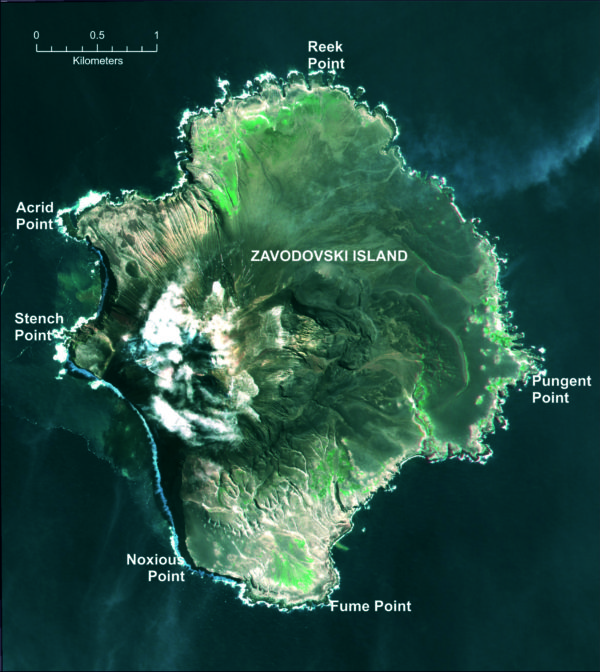 With all the active volcanic activity on the island, it's possible -- as the names suggest -- that Zavodovski island is also the smelliest place in the world. Image credit: UK Antarctic Place-names Committee / British Antarctic Survey / NERC.
With all the active volcanic activity on the island, it's possible -- as the names suggest -- that Zavodovski island is also the smelliest place in the world. Image credit: UK Antarctic Place-names Committee / British Antarctic Survey / NERC.
Zavodovski Island, by the way, is not in the Galapagos, but is rather a 5 km by 5 km island located at the northern edge of the South Sandwich Islands in the southern Atlantic Ocean. It's maybe 1,000 kilometers north of Antarctica, as the crow flies. And it was discovered two centuries ago, but two recent eruptions, in 2012 and 2016, have put the penguin colonies located there at risk. Remember, penguins go there for safety from predators, to breed, and to warm themselves in the Sun, not for food or shelter; they don't exactly create green pastures on their own, but they are an important part of the ecosystem nonetheless.
Niels Bohr and Albert Einstein together in 1925, engaging in their famous conversations/debates about quantum mechanics. Public domain image.
From Denier on winning a scientific debate: "At the end of the day, more and better science will win. If you want to win a scientific debate then forget the debate and focus on doing more and better science."
So what do you do when a scientific debate is over and won, and yet the policies and politics of the world refuses to accept the results? What would you do, hypothetically, in that case as it applies to a flat Earth, to relativity, to evolution, to the Big Bang, etc.? I bring up the Big Bang in contrast to the other three, because unlike a flat Earth (with implications for travel and commerce), relativity (technologies like GPS), evolution (health and medical breakthroughs), there is no tangible, physical, capitalistic benefit or consequence to "believing in" the Big Bang.
How would doing more and better science help the world win?
Image credit: Japan Meteorological Association (JMA), of the monthly average temperatures in February, going back as far as temperature records do. Via the Sydney Morning Herald at http://www.smh.com.au/environment/climate-change/true-shocker-spike-in-….
From Ragtag media exemplifying the difference between scientific and non-scientific debate: "OK my evidence is that a Steve Koonin was a Professor Of Theoretical Physics at Caltech, Was an Under Secretary of Science at the dept of Energy, and is the Director at NYU center for science and urban progress.
Says press releases put out by the govt was about climate data and climate analysis was “MISLEADING and sometimes just WRONG”
FACT,FACT,FACT"
How does one person's credentials, employment history, and claims made by them without showing the supporting scientific evidence count as a valid part of a scientific debate? What is the data? What do you think the world's temperature is doing? What do you think atmospheric gases are doing? What do you think is the connection between temperature and these gases, and what do you think is responsible for the changes in gas concentration?
Do you see the difference between scientific questions and politicized accusations, and does it matter to you? Or is your goal to find and amplify the voices of the people who agree with you to sow doubt and outrage among those doing more and better science to further verify and solidify an already robust conclusion?
From lloyd on commenter policies: "Regarding denier, CFT and ragtag media: can we have Wow back now please?"
Wow is welcome back, as he was after his temporary 1 week ban. If denier, CFT, Ragtag media or anyone else engage in outrageous personal attacks or affronts against other individuals here they will be banned as well. Affronts against reason, logic, or scientific facts are not given bans in the same way; unless someone else is promoting their own pet theories/websites/spam sources, I don't ban for that.
The Atmospheric Infrared Sounder (AIRS) instrument aboard NASA’s Aqua satellite senses temperature using infrared wavelengths. This image shows temperature of the Earth’s surface or clouds covering it for the month of April 2003. The scale ranges from -81 degrees Celsius (-114° Fahrenheit) in black/blue to 47° C (116° F) in red. Higher latitudes are increasingly obscured by clouds, though some features like the Great Lakes are apparent. Northernmost Europe and Eurasia are completely obscured by clouds, while Antarctica stands out cold and clear at the bottom of the image. Image credit: NASA AIRS.
From John on what science should be: "I think the purpose of Science is to describe – ideally to explain – the physical world. The purpose of Science is not to win debates. Science “wins” debates by providing a correct description or explanation of an event or process. Leave oratorical sleights of hand to others."
I think that first sentence is definitely true; the second is arguably true; the third is demonstrably untrue as respects human beings on this planet. So... then what? Where are the "others" who will sway public opinion into agreement with the scientific conclusions? Will the real slim shady please stand up?
Cosmic rays produced by high-energy astrophysics sources can reach Earth's surface. By detecting these fast-moving particles correctly, we can put Einstein's relativity to the test. Image credit: ASPERA collaboration / AStroParticle ERAnet.
From D.C. Sessions on proving relativity for yourself: "$100? Spendthrift. Why not just run a current through a pair of wires and watch as they attract (or repel) each other. Special relativity at work, as even the slow drift velocity is enough to unbalance the effective balance between the forces exerted by moving electrons and stationary protons."
And you are measuring the drift velocity of electrons how? And this is special relativity rather than electric current how? I am not saying that you are wrong; I am saying that this is not exactly a clear and obvious demonstration of relativity the way that receiving and observing a slew of unstable particles created very large distances away -- that shouldn't exist without relativity -- are.
Image credit: Einstein deriving special relativity, 1934, via http://www.relativitycalculator.com/pdfs/einstein_1934_two-blackboard_d….
From Frank on proving Einstein wrong: "I had read somewhere that one time a reporter said to Einstein “There are hundred professors who say you are wrong.”
Einstein answered “If I was really wrong just one professor would be enough.”"
This is very, very relevant. I will try and keep this in mind, and see if I can source that and verify its validity.
A quantum eraser experiment setup, where two entangled particles are separated and measured. No alterations of one particle at its destination affect the outcome of the other. Image credit: Wikimedia Commons user Patrick Edwin Moran, under c.c.a.-s.a.-3.0.
From Sinisa Lazarek quoting the Stanford Encyclopedia of Philosophy: "“11. Conclusion
Grammatical variants of the term ‘observation’ have been applied to impressively different perceptual and non-perceptual process and to records of the results they produce. Their diversity is a reason to doubt whether general philosophical accounts of observation, observables, and observational data can tell epistemologists as much as local accounts grounded in close studies of specific kinds of cases. Furthermore, scientists continue to find ways to produce data that can’t be called observational without stretching the term to the point of vagueness.
It’s plausible that philosophers who value the kind of rigor, precision, and generality to which l logical empiricists and other exact philosophers aspired could do better by examining and developing techniques and results from logic, probability theory, statistics, machine learning, and computer modeling, etc. than by trying to construct highly general theories of observation and its role in science. Logic and the rest seem unable to deliver satisfactory, universally applicable accounts of scientific reasoning. But they have illuminating local applications, some of which can be of use to scientists as well as philosophers.”"
If you're more concerned with an ideology or the "purity" of a definition than what's actually scientifically robust about observations, prediction, measurement and reproducibility, that's your prerogative, but please stay out of the way of those doing the science and adding to our actual, empirical understanding of the world. You are free to advocate for your preferred logical systems or syllogisms or definitions all you like, but don't try and place unnecessary restrictions on physics; it won't obey them anyway.
Image credit: John D. Norton, via http://www.pitt.edu/~jdnorton/teaching/HPS_0410/chapters/Special_relati….
From Kasim Muflahi on misinterpreting relativity: ">>if you observe someone in motion relative to you, their clock will appear to run slow.
That’s because, as the clock moves further and further away from you, the images of the clock take longer and longer times to get to you giving the illusion that the clock is running slow."
So I always hesitate to tell someone that they are wrong because I worry that they will not listen if they hear that... so let's try a different approach.
Sure! When an object moves away from you, all the waves coming from it -- including light waves -- will take longer to reach you from crest-to-crest. So if your idea is correct, time should be sped-up as an object moves towards you, and it should remain constant when an object moves transverse to you.
Unfortunately, we can do the experiment, and not only is the clock really running slow (it's not an illusion), but it does so independent of the redshift/blueshift of the waves. So we can put your idea to the test and show, scientifically, that it is not the way things actually work.
Thanks for a good week, everyone, and looking forward to another great week of science ahead!

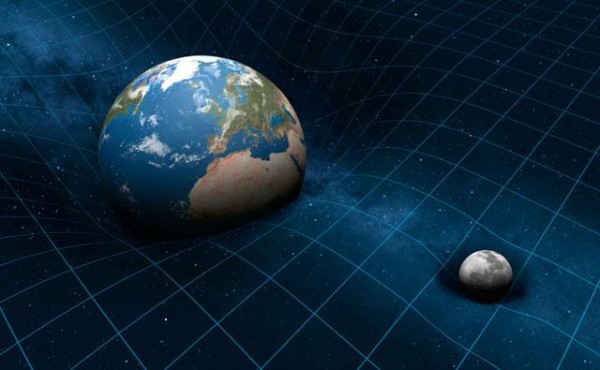
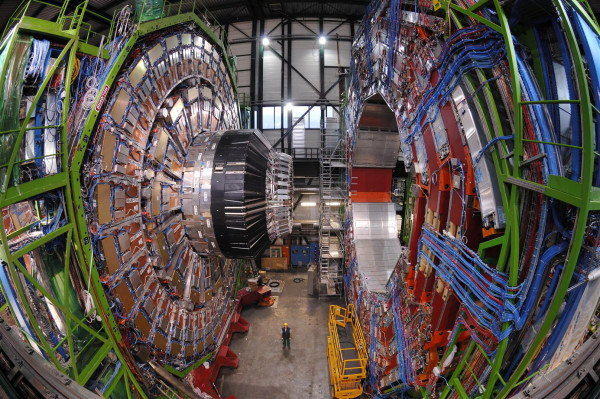


" we totally divorce science from testability"
That is not what I was talking about, my point is that simulations will give us deeper insights and a better understanding of what we have measured. Just like GR and the curvature of space gave a new insight into gravity, no extra test were needed for that, Einstein did the calculations and the results fitted with what was already measured but didn't fit with the 'old' model. In the same way simulations will give us the deeper insights. Einstein was able to do this because the math had evolved, in the same way simulations (the math) will become more powerful.
"So… then what? Where are the “others” who will sway public opinion into agreement with the scientific conclusions?
Stand up, Ethan. Stand up with Martin Gardner, Douglas Hofstadter, Isaac Asimov, Bill Nye, Francis Collins et al. and sway - continue to sway - public opinion into an agreement with the scientific conclusions.
As this blog reputedly demonstrates, Science desperately needs those who can articulate the essence in the vernacular. Perhaps you have a different vision of the purpose of Science, but I remain persuaded it is not to win debates.
Ethan:
"So is there a "real world" independent of observation? You can't answer,..."
Yes i can. The real world (no quotes) has existed for at least 14 billion years or so, maybe eternally (the oscillating model.) So the idea that "observation" (even by very small particles) determines what exists and all properties thereof is way beyond simply "absurd." It is false.
" Does Earth physically change dimensions when viewed near the speed of light? The answer is yes, dependent on which observer you ask."
"It all depends on the 'observer' " is false science. The cosmos exists "all by itself." Science's job is to investigate the world as it already exists. Yes, it does.
" The size of the atmosphere is entirely dependent on that particle's frame-of-reference, and there is no definition of size/length/distance/spatial extent independent of reference frame in relativity."
Earth's atmosphere does not depend on how all those incoming muons "see it." This is the most basic fallacy of classical idealism, now applied as the foundation of relativity.
You clearly have never sorted out the difference.
"But the thing you want to be invariant -- the physical size of a physical object -- simply isn't, nor is it well-defined in the absence of an observer."
I don't "want" anything as an amateur scientist. I am very clear on the epistemology of how science verifies its investigation of the real world.
Yes, there is one, and it doesn't give a damn how you measure it!
@Michael Mooney
It looks like you have an existential crisis:
https://en.wikipedia.org/wiki/Existential_crisis
MM: "So the idea that “observation” (even by very small particles) determines what exists and all properties thereof is way beyond simply “absurd.” It is false"
substitute word observation with interaction and read again.
So the idea that interactions (even by very small particles) determines what exists and all properties thereof is way beyond simply “absurd.” It is false.
That idea is the cornerstone of physics, and it's that idea that brought us from the dark ages. You can of course believe anything you choose, but your preaching religion, not science. It's funny, cause you do use word "dogma" very often.
Elle:
Models always need to be tested against reality. However yes it is very common to use previously collected data to do some of that testing. Because a scientist might unconsciously (or even intentionally) over-fit their hypothesis to currently collected data, we always supplement such historical tests with new tests, evaluating the hypothesis or theory or simulation against observations we didn't know when we built that simulation. But yes, the historical tests are often a very good place to start.
That represents two bad estimates: it underestimates the complexity of the problems and overestimates the current state of computing power.
But it is clear that that what is an amazing in increase in computing power has helped physicists deal with massive amounts of data as well as improve image processing. Any chance of a discussion of that influence, or is it too far off track for you? (Easily understood if it is too far astray.)
@dean,
In the end all that simulation does is discretizing a PDE from physics, and those have very similar terms for fluids, deformables and even quantum systems.
Now you can have a wave equation to describe something basic like a soliton, but if you disturb a PBD medium you can get 'exactly' the same result into the tiniest detail and far more complex. Action and reaction where the soliton is emergent:
"An emergent behavior or emergent property can appear when a number of simple entities (agents) operate in an environment, forming more complex behaviors as a collective. If emergence happens over disparate size scales, then the reason is usually a causal relation across different scales."
@ Elle H.C. #4
This is what passes for scientific discussion in this forum. Ignore the content of the comments and slam the person commenting.
The "existential crisis" is the fundamental assumption in relativity, reiterated by Ethan above, that there is no real world existing in and of itself independent of observation.
But that falls on deaf ears to the thoroughly indoctrinated.
Yes, you can simulate the things you describe. The difficulty is simulating all of the detail of systems of the scale needed for the larger scale you seemed to imply.
I found Ethan's contradiction on length contraction!
Quoting Ethan again, #3 above:
” Does Earth physically change dimensions when viewed near the speed of light? The answer is yes, dependent on which observer you ask.”
"THE ANSWER IS YES."
From Week #152:
---------------------------------
From Michael Mooney on traveling close to the speed of light: “Does special relativity actually claim that distance, between stars for instance, depends on the speed of a traveler between them… not just “apparent” distance, but actual astronomical distance?”
(Ethan):
"It depends on the distance and to whom. If you’re in the spacecraft and moving towards a star 4 light years away, but you’re doing it at 88% the speed of light, then yes: the star will be only 2 light years from you, and you will reach it in a little over two and a quarter years. That contraction is “real”. Now your spaceship, to an outside observer, will also appear contracted, as the ball in the above image appears. Is that contraction physically real? We don’t think so. Relativity is still challenging to wrap your head around, even more than 100 years after we’ve first discovered it.”
"IS THAT CONTRACTION PHYSICALLY REAL? WE DON'T THINK SO."
Substitute the physically shrinking Earth in the first example with the (not really) shrinking spaceship in the second and the contradiction slaps Ethan in the face beyond equivocation.
Hey Ethan!; I finally found it! Time to face it head on... or kick me out if you can't handle it.
@Michael Mooney,
I am not 'slamming' you. I am just pointing out that your problem has more likely a psychological origin. It might be beneficial if you go seek help in that direction. I just want you to find out what is really bugging you. I am afraid that physicist won't be able to help you. You're running rond in circles.
@dean,
There's some truth in that, but I don't think we're are very far from doing so. Therefore my motivation to shift focus from investing in particle colliders towards simulations.
1 planck length = 1,6 × 10^-26 nanometre
The latest Millenium Run XXL in 2010 had 10^9 particles
@MM,
"I finally found it!"
Then you are done here.
There is no reason left for you to keep posting.
I'll just wait for Ethan's reply, if he cares to address his obvious contradiction. I am not intimidated by relativity's true believers who tolerate no criticism and want to ban all critics.
Just a quick note to Elle H.C. for closure:
Your assumed superiority and insulting condescension are much more subtle than "slamming" of course. But thanks for your misplaced concern anyway. (Not!)
" I just want you to find out what is really bugging you."
It is very obvious "what is bugging me." The belief that objects physically shrink as a result of differences in "observation" is bullshit being propagated as science, ever since Einstein and his colleagues invented special relativity.
There is no physics to support the theory of shrinking physical objects.
There it is again whether you can hear it or not.
"How does one person’s credentials, employment history, and claims made by them without showing the supporting scientific evidence count as a valid part of a scientific debate?"
\
LOL.. I Know You Are But What Am I?
https://www.youtube.com/watch?v=lA5UqUyFmT0
@MM
"It is very obvious “what is bugging me.” The belief that objects physically shrink as a result of differences in “observation” is bullshit being propagated as science, ever since Einstein and his colleagues invented special relativity."
It was not Einstein who came up with this idea, it was a dutch guy named Lorenz, before Einstein. It is even called 'Lorentz contraction'. Einstein just fitted it later on into his model of SR.
https://en.wikipedia.org/wiki/Length_contraction
MM:
Why not expect that his most recent answer to your question is his most accurate description of his opinion?
Because it clearly contradicts his earlier opinion, and intellectual honesty demands that he admit it and then explain the physics of shrinking objects in the real world, independent of theoretical differences in observation.
...Except that he doesn't believe there is a "real world"... his scare quotes.
The latter is at least consistent with his stated philosophy as an instrumentalist,i.e., that there is no physical reality independent of all varieties of measurements.
"Reality" according to Ethan... a brief review:
-----------------------------
" Does Earth physically change dimensions when viewed near the speed of light? The answer is yes, dependent on which observer you ask.”
“But the thing you want to be invariant — the physical size of a physical object — simply isn’t, nor is it well-defined in the absence of an observer.”
” Are you claiming that physical objects aren’t really contracted in their direction of motion? They absolutely are…”
-------------------------
"Absolutely?"
Frames Of Reference... The Observer...
Relativity's Absolute Reality.
NO REAL WORLD. IT ALL DEPENDS ON HOW YOU LOOK AT IT... and changes accordingly. No physics of shrinking physical objects required. It's magic!
@MM
Have you seen the 'magic' of the black/blue vs gold/white dress?
http://imgur.com/gallery/NEaAu
Fascinating isn't it. ?
This is your scientific explanation of how trains, Earth, and all other other physical things actually physically shrink... and the space between stars?
Optical illusions are fun as they trick one's perception but they do not address the above... unless you also admit that they too are (theoretical) illusions.
Well if you are able to grasp why the perception of the colors of the dress change depending on the background, than you should also be able to grasp why objects start to appear differently depending on how fast they pass by you.
The relation, relativity, makes the difference. Moving fast in relation to you, or moving slow in relation to you; and you get two different perceptions.
So wow it's magic, how the object looks suddenly shorter, well it only looks that way because it is moving faster. The tail of the object comes much quicker into view behind the front when the object is moving faster. Keep in mind that you are not turning your head and eyes along while looking at the moving object because than they're moving along with the object.
And keep in mind that you can only measure what you can see, so if it 'looks' shorter it is also shorter according to your measurements. So the object looks (is) longer or shorter.
Only when you are moving along with it than you can put your ruler next to the object and measure it without having to worry that it looks smaller, because than it is standing still.
Also check this to get a precise understanding;
https://www.boundless.com/physics/textbooks/boundless-physics-textbook/…
Quantified matter is beyond human concepts in measurement. Speeds of forward or backward have no limit. Beyond a 3 dimension world time does not exist only infinity chemical matter. Absolute 0 or matter is void, No way, impossible, Nix.
Elle H.C., from your linked article:
" we will show how perceived time and length are affected."
"Perceived" is the key word.
Perceptual differences don't shrink physical objects.
And slow ticking clocks don't change the time it takes for Earth to rotate or orbit the sun... the standardized day and year.
MM, its seems to me that you're accusing Ethan and the GR gang of some sort of philosophical idealism, which is not the case at all.
As for the "real world", we're stuck behind the veil of our perceptions, with the choice of either questioning reality to the point of solipsism craziness, or instead choose to operate on the assumption that yes, there indeed is an objective reality out there past our immediate personal observations/sensations. I think that's what Hume prattled on about for thousands of pages in the Treatise of Human Nature, but I could be wrong with my interpretation. Anywho, empiricism and the scientific method with it's "observations" is about as good as we can do at accessing objective reality while being able to communicate about it consistently and clearly. How else would you propose to do it? How else would you gather any information without observation, to confirm your theory of non-relativistic earth shrinkage, or whatever it is you're perseverating with?
fred: " to confirm your theory of non-relativistic earth shrinkage..."
Quite the opposite:
I have used the the fact that EARTH DOES NOT SHRINK as an example of the irrational nonsense claim of length contraction that a flat Earth is equally valid, as observed by a high speed traveler... "all frames of reference being equally valid." The statement, "It all depends on how you look at it " (relativistically speaking) IS philosophical idealism in denial of an objective world independent of how it is observed or measured.
Again, the "proper length" of an object, measured from at rest with it IS its objective actual physical length, not a distorted image of the object carried by light to an observer approaching at near light speed.
This is an assertion, not a "fact." It also happens to be meaningless.
^ Oh, right:
Something that you have steadfastly proved either unwilling or unable to define.
^^ Last one:
Please try to figure out the difference between "proper length" and "proper distance," at least.
No, GR is neither philosophical idealism, nor does it deny the existence of objective reality independent of how it is observed, as you claim. Quite the opposite: it assumes an objective reality and then studies it, the same way mathematicians assume the validity of set theory and then do math. A fundamental leap of faith, if you will, but a necessary one if either endeavor is to continue in any meaningful way.
As a description of objective reality, GR provides extraordinary explanatory power and has been supported by the evidence at every turn. It explains the very phenomena you're trying to use to discredit it.
You seem to be, quite understandably I should add, under the spell of the more intuitive aspects of Newtonian physics, which separate static objective reality of physical objects from the time dimension that GR accounts for. GR is simply a more thorough and complete description of reality. That doesn't mean grokking 'space-time' is intuitive or natural, except for folks like Einstein perhaps.
fred,
To the point of your last paragraph...
Thanks so much for your generous understanding of my delusion as "under the spell" of Newtonian physics. Very kind.
First, there are no "static objects." Everything is moving through space and constantly changing. That all "takes time."
Second, time is not an entity, part of a fabric woven together with space to be curved by mass. That is just a geometric/math model, not a "real world" malleable medium. (The math is an improvement on Newtonian physics, for sure.)
Time is an agreed, shared convention based on the revolution and orbit of Earth. We make arbitrary divisions of those natural phenomena and call these units years, days, hours, minutes, seconds, and very small fractions of seconds. Atomic clocks have standardized these units very precisely.
Clocks vary as timekeepers depending on what different forces they are subjected to; i.e., acceleration to higher speed or more or less force of gravity depending on altitude.
Btw, shrinking physical objects are the subject of SR, not GR. Still no physics of how physical objects shrink... but for appearing differently to various observers.... "all equally valid."
"...except for folks like Einstein perhaps."
Yes, of course, Einstein knows best. If you don't agree you must be wrong.
No thanks for the condescension.